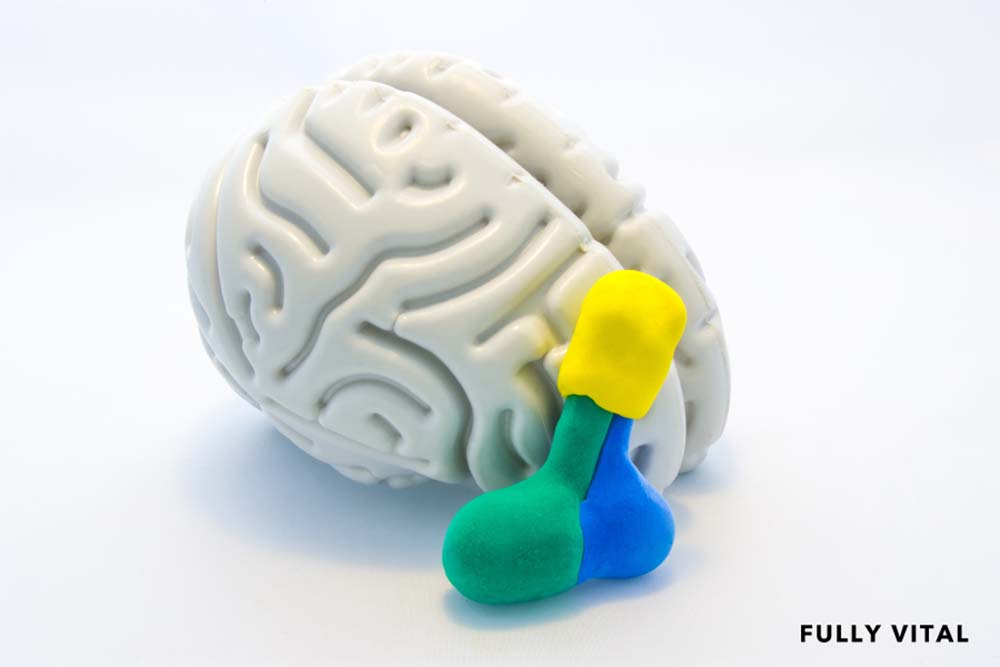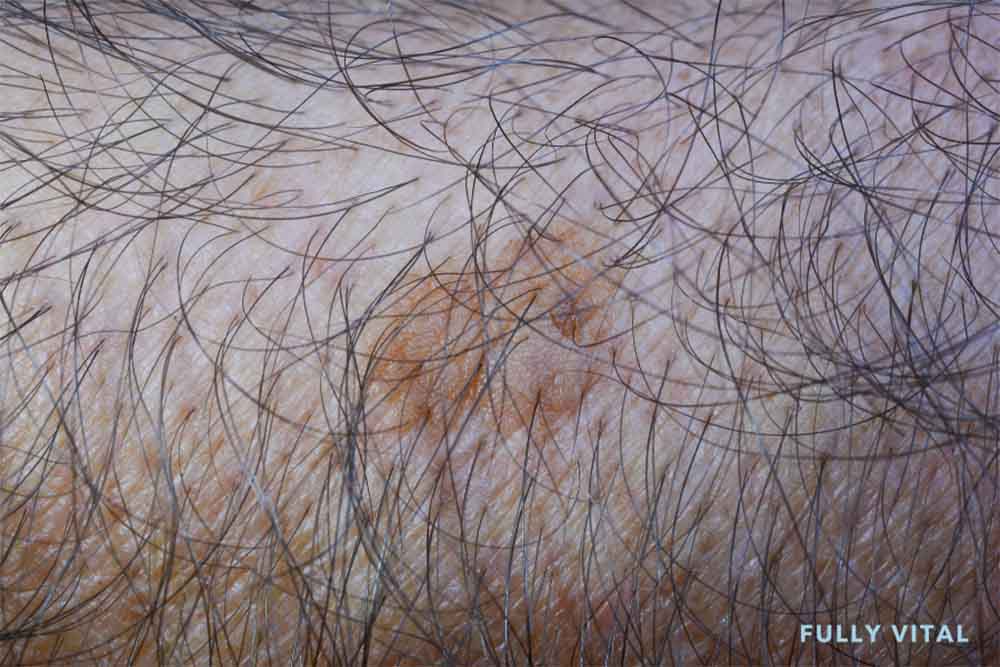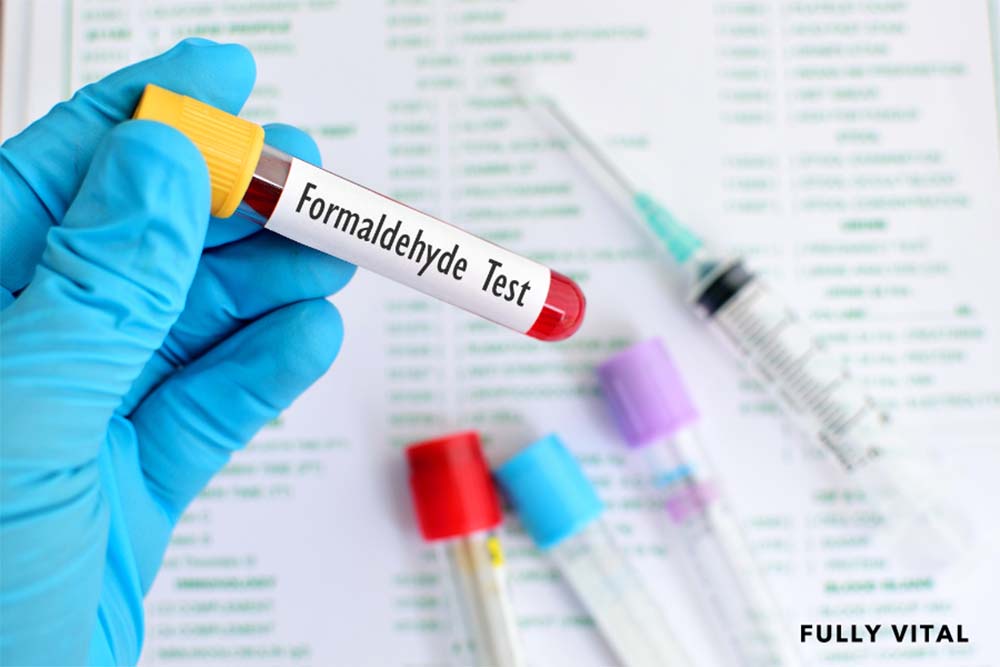
Understanding The Pituitary Gland For Hair Growth: Unveiling Its Secrets
Welcome to our comprehensive guide to the pituitary gland, a remarkable part of your body that plays a vital role in your hair growth journey.
If you're a woman seeking ways to stimulate hair growth, you've come to the right place.
In this article, we'll delve into the significance of the pituitary gland, how it functions, its benefits, potential drawbacks, and even explore alternative approaches.
Let's embark on this informative ride together!

I LOVE MY HAIR NOW
FullyVital hair serum and hair vitamins made tremendous improvements in my hair. I truly love my hair now.
Dorit S.,
What Is The Pituitary Gland?
The pituitary gland, often referred to as the "master gland," is a pea-sized structure situated at the base of your brain.
Despite its small size, it wields immense power by controlling various hormonal processes in your body, including those related to hair growth.

Why Is The Pituitary Gland Important For Hair Growth?
The pituitary gland is vital for hair growth due to its role in regulating hormone secretion.
It produces and releases hormones such as growth hormone and thyroid-stimulating hormone, which influence the growth and health of hair follicles.
Growth hormone promotes cell reproduction and regeneration, including in hair follicles.
Additionally, thyroid-stimulating hormone regulates the thyroid gland, affecting metabolism and thereby impacting hair growth.
Disturbances in pituitary gland function can lead to imbalances in these hormones, potentially causing hair loss or reduced hair growth.
Thus, the pituitary gland's proper functioning is crucial for maintaining healthy hair growth cycles.
How Does The Pituitary Gland Work Its Magic?
At the heart of the pituitary gland's magic is its ability to produce and secrete essential hormones like follicle-stimulating hormone (FSH) and luteinizing hormone (LH).
These hormones collaborate to regulate the function of your ovaries, which, in turn, impacts hair growth patterns.1
What Are The Benefits Of A Well-Functioning Pituitary Gland?
A properly functioning pituitary gland can be a game-changer for your hair growth aspirations.
It ensures the optimal balance of hormones that contribute to healthy hair follicles, which results in luscious and vibrant hair.
What Are The Potential Downsides Of Pituitary Gland Imbalance?
While the pituitary gland holds the key to hair growth, an imbalance in its hormonal regulation might lead to issues such as hair loss or thinning.
It's crucial to be aware of potential downsides and seek professional guidance if you suspect any irregularities.
What Are Some Alternatives To Enhance Hair Growth?
While the pituitary gland plays a pivotal role in hair growth, it's not the only factor at play.
Exploring alternative strategies like nourishing diets, topical treatments, and lifestyle adjustments can complement the gland's efforts and promote vibrant hair.
What Are The Symptoms Of Pituitary Gland Problems?
Pituitary gland problems can manifest through various symptoms, some of which might include:
Hair loss or thinning
Changes in hormone levels due to pituitary gland issues can lead to hair shedding or reduced hair quality.
Fatigue
Hormonal imbalances might cause energy fluctuations that result in persistent fatigue.
Irregular periods
Hormonal disruptions can affect menstrual cycles, impacting hair growth patterns.
Vision changes
An enlarged pituitary gland might press against optic nerves, leading to vision issues.
Headaches
Tumors or growths on the pituitary gland can trigger chronic headaches.
Unexplained weight changes
Hormonal shifts can influence metabolism and lead to weight gain or loss.
Can An Enlarged Pituitary Gland Cause Hair Loss?
Yes, an enlarged pituitary gland can potentially cause hair loss.2
When the gland grows abnormally large, it might press against nearby structures, disrupting hormonal balance.
This disruption can contribute to hair loss or thinning.
Are Pituitary Gland Problems Serious?
Pituitary gland problems should be taken seriously, as they can impact various aspects of health, including hair growth.
While not all issues are life-threatening, seeking medical attention is crucial to prevent potential complications.3
How Do You Keep Your Pituitary Gland Healthy?
Maintaining a healthy pituitary gland is essential for optimal hair growth and overall well-being.
Here's how you can promote its health:
-
Balanced diet: Consume nutrient-rich foods that support hormonal balance and brain health.
-
Regular exercise: Engage in physical activity to regulate hormones and reduce stress.
-
Adequate sleep: Prioritize sleep to allow the pituitary gland to perform its functions effectively.
-
Stress management: Practice relaxation techniques to minimize stress, which can impact hormone production.
-
Hydration: Stay well-hydrated to support the transport of hormones and nutrients.
Can Pituitary Gland Problems Be Cured?
The prognosis of pituitary gland problems varies based on the underlying cause.
While some issues might be manageable and improve with medical interventions, others might require ongoing treatment.
Timely diagnosis and appropriate medical care are key to managing these problems effectively.
What Is The History Of The Pituitary Gland?
The history of the pituitary gland's recognition and its connection to hair health is a journey of scientific discovery:
-
Ancient beliefs: Ancient civilizations acknowledged the gland's importance, often associating it with spiritual or mystical significance.
-
Scientific understanding: Over time, advancements in medical science revealed the gland's role in regulating hormones that influence various bodily functions, including hair growth.
-
Hair restoration: Historical records show attempts at using animal pituitary extracts for hair restoration, laying the foundation for contemporary hair growth treatments.
What Is The Current Environment Of Pituitary Gland?
In the present day, the pituitary gland holds substantial relevance for Hair Growth Product Companies:
-
Scientific validation: Modern research confirms the gland's influence on hair follicle health and hair growth.
-
Targeted solutions: Hair Growth Product Companies leverage scientific insights to develop products that support pituitary gland function and hormonal balance.
-
Holistic approach: The integration of pituitary-focused solutions into comprehensive hair care regimens showcases a commitment to addressing underlying causes of hair concerns.
Our Best Sellers
What Is The Future Of The Pituitary Gland?
Looking ahead, the pituitary gland's role in hair growth holds exciting possibilities:
-
Advanced treatments: Continued research may lead to more precise interventions that directly target pituitary-related hair issues.
-
Personalized approaches: Future innovations could include tailored solutions based on individual pituitary gland function and hormonal profiles.
-
Holistic wellness: Recognizing the interplay between pituitary health, overall well-being, and hair growth, Hair Growth Product Companies may expand their focus to include comprehensive health support.
Experience The Power Of Revitalized Hair With Fully VitalDiscover a transformative solution that goes beyond the surface, addressing the core of hair health. At Fully Vital, we're on a mission to redefine your relationship with your locks. Our science-backed hair growth products are designed to:
Welcome a new era of hair care with Fully Vital—where every strand tells a story of empowered beauty and timeless grace. |
Final Thoughts On The Pituitary Gland
In our journey through the intricacies of the pituitary gland and its profound impact on hair growth, we've delved deep into the heart of what makes your locks flourish.
From understanding the gland's significance to exploring its historical evolution and envisioning its future potential, we've uncovered a treasure trove of insights that underscore its importance.
As you stand on the cusp of empowered hair care, armed with knowledge about the pituitary gland's role in maintaining luscious locks, remember that nurturing your hair extends beyond the surface.
It's a holistic journey that embraces both inner well-being and outer radiance.
Here at Fully Vital, we're dedicated to your hair's health and vitality.
Our range of hair growth products is meticulously crafted to halt the signs of aging, enabling you to cultivate a harmonious relationship with your hair.
It's time to embark on a transformational path that celebrates the innate beauty of your locks.
Let's continue this journey together, hand in hand with the wisdom of science and the promise of healthier, more vibrant hair.
Frequently Asked Questions About The Pituitary Gland
How does aging impact pituitary gland function and its relationship to hair growth?
As you age, the pituitary gland's function might naturally decline, leading to changes in hormone production.
This can contribute to age-related hair thinning and other hair-related concerns.
However, a healthy lifestyle and medical guidance can help mitigate these effects.
Can the pituitary gland directly influence hair growth?
The pituitary gland indirectly influences hair growth by regulating hormone production that affects hair follicles.
Are hormonal imbalances related to the pituitary gland common?
Hormonal imbalances linked to the pituitary gland can occur and might impact hair health, but they can often be managed with medical guidance.
How can I maintain a healthy pituitary gland?
Prioritize a balanced diet, regular exercise, stress management, and sufficient sleep to support overall hormonal health, including the pituitary gland.
Can issues with the pituitary gland be a sole cause of hair loss?
Hair loss is typically caused by a combination of factors, and while pituitary gland issues might contribute, they're rarely the sole cause.
Are there medical treatments to address pituitary gland disorders affecting hair growth?
Yes, medical interventions are available to manage pituitary gland disorders.
Consulting a healthcare professional is crucial for proper diagnosis and treatment.
How long does it take to see hair growth improvements after addressing pituitary gland issues?
Hair growth is a gradual process.
After addressing pituitary gland issues, visible improvements in hair quality and growth might take several weeks to months.
Can stress affect pituitary gland function and hair health?
Stress can indeed impact the function of the pituitary gland.
Excessive stress triggers the release of cortisol, a hormone that, when elevated, can disrupt the balance of other hormones crucial for hair growth.
Managing stress is vital for maintaining both pituitary gland health and vibrant hair.
Are there specific nutrients that support pituitary gland health and hair growth?
Absolutely.
Nutrients like vitamin D, zinc, iron, and omega-3 fatty acids play a role in supporting both pituitary gland function and hair growth.
A well-balanced diet rich in these nutrients can contribute to healthier hair follicles.
Is hormone replacement therapy (HRT) a solution for pituitary gland-related hair loss?
Hormone replacement therapy might be considered in cases where pituitary gland issues have led to hormonal imbalances affecting hair growth.
However, the decision to undergo HRT should be made in consultation with a healthcare professional, as it comes with potential risks and benefits.
Sources:
-
Orlowski, M., & Sarao, M. S. (2018, December 16). Physiology, Follicle Stimulating Hormone. Nih.gov; StatPearls Publishing. https://www.ncbi.nlm.nih.gov/books/NBK535442/
-
Pituitary Tumor. (2019). Uclahealth.org; UCLA Health. https://www.uclahealth.org/medical-services/surgery/endocrine-surgery/patient-resources/patient-education/endocrine-surgery-encyclopedia/pituitary-tumor
-
Understanding Pituitary Disorders | Brain Institute | OHSU. (n.d.). Www.ohsu.edu. https://www.ohsu.edu/brain-institute/understanding-pituitary-disorders







